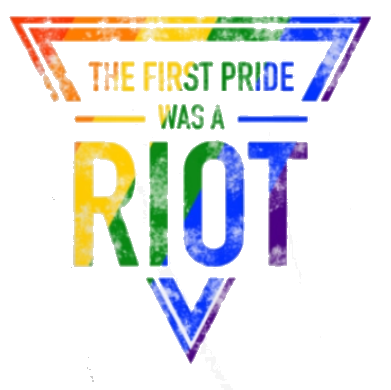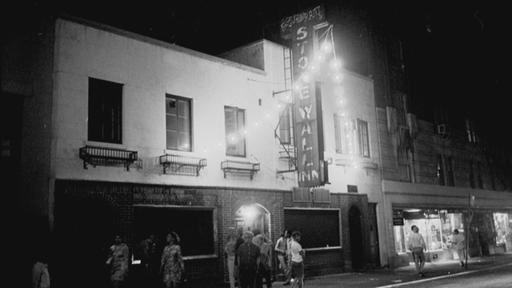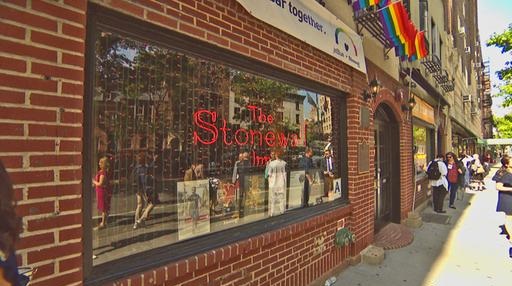Stonewall
Was ist Stonewall? Am 28. Juni 1969 feierten rund 200 vor allem queere Menschen in der beliebten Bar „Stonewall Inn“ in der Christopher Street im Greenwich Village, als eine Polizei-Razzia stattfand. Diese Razzien waren in den 1960er Jahren in den USA üblich und betrafen Bars, in denen sich die LGBTIQ-Community traf. In folge solcher Razzien wurden queere Menschen, vor allem trans Personen, häufig zwangsgeoutet. Doch die Razzia, eine von vielen zur damaligen Zeit, war anders als zuvor. Denn als die Polizisten Stormé DeLarverie, eine Schwarze lesbische Frau, abführten und im Handgemenge mit einem Schlagstock traktierten, hatten die Besucher*innen der Bar genug – allen voran Marsha P. Johnson und Sylvia Rivera, eine Schwarze trans Frau und eine Latinx trans Frau. |
What is Stonewall? On 28 June 1969, around 200 mostly queer people were partying at the popular Stonewall Inn bar on Christopher Street in Greenwich Village when a police raid took place. These raids were common in the 1960s in the US and targeted bars where the LGBTIQ community gathered. As a result of such raids, queer people, especially trans people, were often forcibly outed. But the raid, one of many at the time, was different than before. When the cops took Stormé DeLarverie, a Black lesbian woman, away and beat her with a baton in a scuffle, the bar patrons – especially Marsha P. Johnson and Sylvia Rivera, a Black trans woman and a Latinx trans woman – had had enough. |

„Wir hatten nichts, und so hatten wir nichts zu verlieren“, erinnert sich Tommy Lanigan-Schmidt, der damals dabei war. Flaschen und Steine flogen auf die Polizisten, die sich bald von 600 Menschen bedrängt sahen. Diese verbarrikadierten sich schließlich in der Bar, bis eine Spezialeinheit die Situation unter Kontrolle brachte. In den folgenden Tagen solidarisierten sich andere queere Menschen sowie die Nachbarschaft von Greenwich Village mit den Protestierenden des “Stonewall Inn“. Fünf Tage lang kam es wiederholt zu Auseinandersetzungen mit der Polizei. |
„We had nothing, so we had nothing to lose,“ recalls Tommy Lanigan-Schmidt, who was there at the time. Bottles and stones flew at the police officers, who soon found themselves beset by 600 people. They finally barricaded themselves in the bar until a special unit brought the situation under control. In the following days, other queer people as well as the Greenwich Village neighbourhood showed solidarity with the protesters at the „Stonewall Inn“. For five days, there were repeated clashes with the police. |
Wann wurde der Christopher Street Day erstmals gefeiert? Schon zum ersten Jahrestag der Krawalle zogen rund 4000 queere Menschen durch New York und forderten Gleichberechtigung. Heute erinnert der jährliche Christopher Street Day (CSD) weltweit an die Vorfälle. Er steht für das Selbstbewusstsein der LGBTQ-Gemeinschaft (englische Abkürzung für Lesben, Schwule, Bisexuelle, Transsexuelle und queer) und ihren Widerstand gegen Diskriminierung. Deutschland: 1972: In Münster findet die erste Schwulendemo in der Geschichte der Bundesrepublik statt. 1979: In Bremen und Berlin finden erstmals Demos statt, die als Christopher Street Day (CSD) bezeichnet werden. |
When was Christopher Street Day first celebrated? Already on the first anniversary of the riots, around 4000 queer people marched through New York demanding equal rights. Today, the annual Christopher Street Day (CSD) commemorates the incidents worldwide. It stands for the self-confidence of the LGBTQ community (English abbreviation for lesbian, gay, bisexual, transsexual and queer) and their resistance against discrimination.
Germany: 1972: The first gay demonstration in the history of the Federal Republic takes place in Münster. 1979: In Bremen and Berlin demos are held for the first time, which are called Christopher Street Day (CSD). |


Die Bar Stonewall Inn war 1969 der Ausgangspunkt des Widerstands gegen die Polizeiwillkür und existiert bis heute und steht zum Jahrestag im Mittelpunkt der Erinnerungen. |
The bar Stonewall Inn was the starting point of the resistance against police arbitrariness in 1969 and exists to this day and is the focus of memories on the anniversary. |